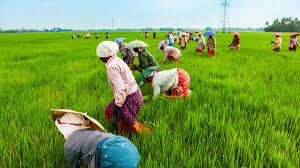“Agriculture is the most healthful, most useful, and most noble employment of men.” – George Washington.
Agriculture is the backbone of Nigeria’s economy, providing livelihoods for millions of its occupants and contributing significantly to the country’s GDP. However, the sector faces numerous challenges, including environmental degradation, climate change, and economic constraints. Sustainable agriculture, which integrates environmental health, economic profitability, and social equity, presents a viable solution to these challenges.
The Importance of Sustainable Agriculture
Sustainable agriculture is crucial for meeting society’s food and textile needs without compromising the ability of future generations to meet their own needs. It involves practices that protect the environment, enhance economic viability, and promote social responsibility. For Nigeria, sustainable agriculture is essential for ensuring food security, reducing poverty, and mitigating the impacts of climate change.
Implementing sustainable agricultural practices can lead to numerous benefits:
- Environmental Benefits: Reducing soil erosion, conserving water, and enhancing biodiversity.
- Economic Benefits: Increasing productivity, reducing costs through efficient resource use, and opening up new markets for organic products.
- Social Benefits: Improving food security, creating jobs, and promoting rural development.
The Current State of Agriculture in Nigeria
Nigeria’s agricultural sector is diverse, with key crops including cassava, yams, maize, and rice. Traditionally, farming practices have relied on manual labor and rudimentary tools. However, modern farming methods, though still limited, are being adopted. Despite its potential, the sector faces numerous challenges such as:
- Environmental Impact: Over-reliance on chemical fertilizers and pesticides has led to soil degradation and water pollution.
- Economic Importance: Agriculture remains a major source of income, yet many farmers struggle with low productivity and profitability.

Challenges Facing Sustainable Agriculture in Nigeria
- Environmental Degradation: Nigeria’s agricultural practices have often led to significant environmental damage. Soil erosion, deforestation, and loss of biodiversity are common issues. Water scarcity and pollution further exacerbate the problem.
- Climate Change: Climate change poses a severe threat to agriculture. Unpredictable weather patterns, increased temperatures, and extreme events like floods and droughts impact crop yields and farming livelihoods.
- Economic and Financial Barriers: Many farmers lack access to credit and financial services, making it difficult to invest in sustainable practices. High costs of sustainable inputs and technologies also deter adoption.
- Lack of Education and Awareness: A significant barrier to sustainable agriculture is the limited knowledge among farmers about sustainable practices. Agricultural extension services, which could bridge this gap, are often inadequate.
- Infrastructure Deficiencies: Poor infrastructure hampers agricultural productivity. Inadequate transportation, storage facilities, and irrigation systems lead to post-harvest losses and inefficient water use.
- Policy and Institutional Challenges: There is often a lack of supportive policies and incentives to promote sustainable agriculture. Where policies exist, weak implementation further hinders progress.
The Pathways to Sustainable Agriculture in Nigeria
- Promoting Agroecology and Organic Farming: Agroecology emphasizes the integration of ecological principles into farming practices. Organic farming, which avoids synthetic chemicals, is another viable path. Success stories from Nigerian farmers demonstrate the potential of these practices.
- Investing in Research and Development: Research is essential for developing innovative solutions to agricultural challenges. Nigerian research institutions are making strides in this area, but more investment is needed.
- Enhancing Farmer Education and Training: Agricultural extension services play a crucial role in educating farmers about sustainable practices. Expanding these services and providing more training programs can significantly impact.
- Improving Access to Finance: Financial support is critical for farmers to adopt sustainable practices. Microfinance institutions and cooperatives can provide much-needed credit. Government and private sector initiatives can also help.
- Developing Infrastructure: Building better roads, storage facilities, and irrigation systems can reduce post-harvest losses and improve productivity. Government and NGO efforts in this area are essential.
- Implementing Supportive Policies: Effective policies that promote sustainable practices and provide incentives are necessary. Learning from successful policies in other countries can guide Nigeria’s approach.
- Leveraging Technology and Innovation: Technology can revolutionize sustainable agriculture. Precision agriculture, mobile apps for farmers, and innovative startups are making significant contributions to the sector.

Government Interventions and Policies
In recent years, the Nigerian government has taken steps to promote sustainable agriculture. The introduction of the Agriculture Promotion Policy (APP) aimed to enhance food security, reduce imports, and promote the export of agricultural products. Additionally, the government’s focus on the Green Alternative plan emphasizes sustainability and environmental protection in agricultural practices.
Governors in various states have also highlighted the importance of sustainable agriculture. For instance, the Governor of Lagos State, Babajide Sanwo-Olu, has emphasized the need for innovative farming techniques and partnerships with the private sector to enhance agricultural productivity and sustainability. Similarly, the Governor of Kebbi State, Atiku Bagudu, has been an advocate for rice farming and sustainable agricultural practices to boost the state’s economy.
Conclusion
Sustainable agriculture is vital for Nigeria’s future. It addresses environmental challenges, enhances economic viability, and promotes social well-being. However, achieving this requires concerted efforts from all stakeholders – the government, private sector, farmers, and NGOs. By investing in research, improving education, providing financial support, and developing infrastructure, Nigeria can build a sustainable and prosperous agricultural sector.
Credit
Written by Adegoke Awau
Chief Editor: Ugwuamadi Collins
